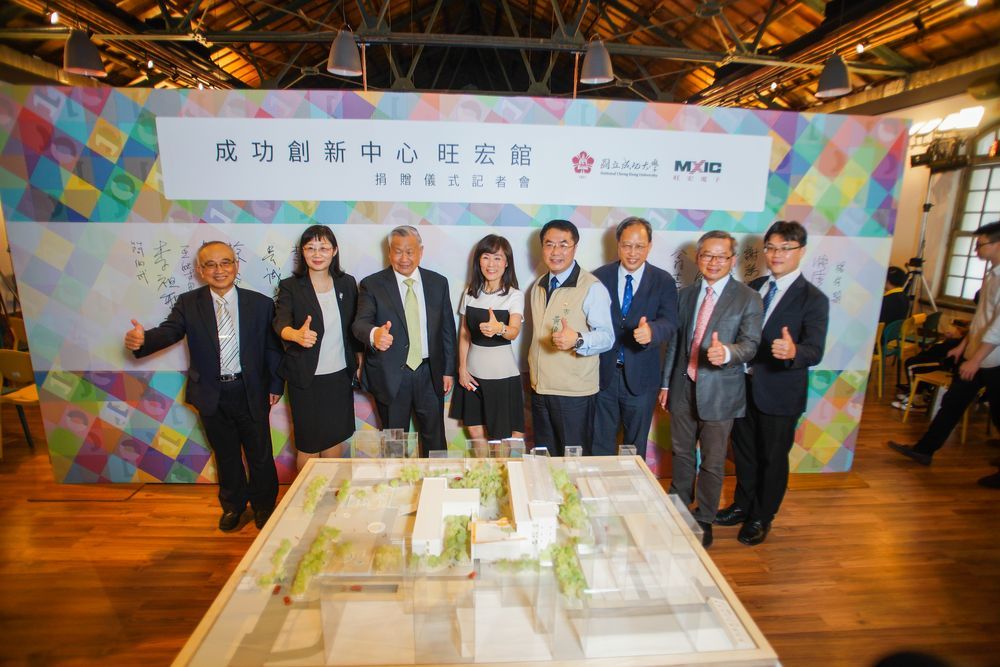

 |
|
|---|---|
From left, former chancellor of Kun Shan University and independent director of Macronix International Co Su Yen-kun, Deputy Minister of Science and Technology Tsou Yu-han, Macronix Chairman and CEO Miin Wu, National Cheng Kung University (NCKU) chancellor Jenny Su, Tainan Mayor Huang Wei-che, Ministry of Education (MOE) Chief Secretary Chu Nan-hsien, NCKU vice chancellor Wu Cheng-wen and Department of Higher Education Director Chu Chun-chang pose for a photograph at a project initiation ceremony for the Macronix Innovation Center on Aug. 28. |
As we enter a new era of artificial intelligence (AI), Taiwan needs to focus on the bigger picture, fostering ideas and building environments that will help cultivate the next generation of talented software engineers.
Macronix International Co, a leading global manufacturer of integrated non-volatile memory components, has generously provided National Cheng Kung University (NCKU) with a NT$420 million donation for the construction of the Macronix Innovation Center: a historic new space on campus that will fuse together the energies and talents of Macronix and NCKU.
Macronix hopes that providing a creative space for teaching and research will provide synergies, foster new talent and demonstrate the company’s dedication to corporate social responsibility. NCKU believes the facility will encourage new models for teaching and research and is promoting the School of Computing, which will be located within the center, as a “university of the future” that will drive forward innovation and progress.
On Wednesday Macronix held a project initiation ceremony on campus at NCKU to celebrate a new chapter in a rich history of collaboration between Macronix and the university that will maximize resource potential and further the development of humanity.
The project initiation ceremony was held at the Da Cheng Building on NCKU’s Kuang-Fu campus in Tainan and co-hosted by NCKU chancellor Jenny Su (蘇慧貞) and Macronix Chairman and CEO Miin Wu (吳敏) to thank Wu, an alumnus of the university, for his generous donation: a model example of a successful company giving back to society.
Minister of Education Pan Wen-chung (潘文忠) was unable to attend in person due to prior commitments, but sent ministry Chief Secretary Chu Nan-hsien (朱楠賢) and Department of Higher Education Director Chu Chun-chang (朱俊璋) to attend in his place.
Chu remarked that in Taiwan it is normal for companies who sponsor the construction of a new facility at a university to request that a proportion of the space is set aside for their exclusive use. However, Wu’s donation to his alma mater takes a different approach, said Chu, and added that Wu’s decision to give the university free rein to innovate and design the facility, shows his selfless dedication to the development of higher education and the importance Wu places on corporate social responsibility and the creation of a distinctive corporate culture.
Wu was the 59th student to graduate from the school’s Department of Electrical Engineering and the 62nd to obtain a degree from its Graduate School of Electrical Engineering. Wu founded Macronix International Co. in 1989. Today the company is a leading global manufacturer of integrated non-volatile memory components. Wu, who in 2016 received an honorary doctorate from his alma mater, says his NT$420 million donation is his way of saying thanks and giving back to his university. In her speech, Su thanked Wu for the unstinting and selfless support he has given NCKU.
Su says that, as we enter the AI age, innovative and cross disciplinary ways of thinking are emerging, requiring a radical new approach to education and the cultivation of new talent. The Macronix Innovation Center is addressing this need with the addition of the School of Computing, modeled on the US’ Massachusetts Institute of Technology (MIT) College of Computing, to its existing nine schools, to cultivate the talent needed for the future challenges in the world of computing.